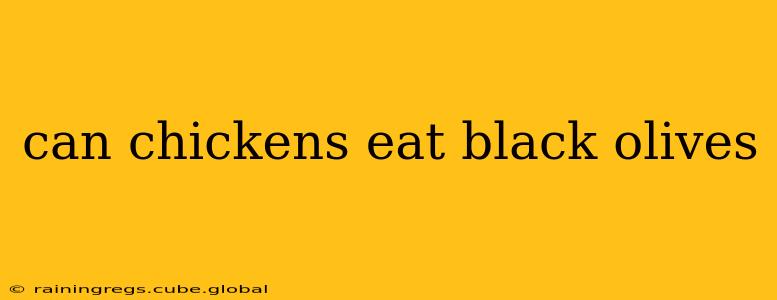Chickens are naturally curious foragers, constantly pecking at anything that catches their eye. This inquisitive nature often leads to questions from chicken keepers about what's safe for their feathered friends to consume. One such question frequently pops up: can chickens eat black olives? The short answer is: yes, but with caution. While not inherently toxic, black olives aren't a staple food and should only be offered as an occasional treat.
Let's delve into the details and answer some common questions surrounding chickens and black olives.
Are Black Olives Safe for Chickens?
Yes, black olives are generally safe for chickens in moderation. They contain some vitamins and minerals, like vitamin E and iron, which can be beneficial in small amounts. However, the high salt content in most commercially prepared olives is a significant concern. Too much salt can lead to dehydration, sodium ion poisoning, and other health problems in chickens.
What are the Potential Risks of Feeding Chickens Black Olives?
The primary risk associated with feeding chickens black olives is their high sodium content. Overconsumption can result in:
- Dehydration: Salt draws water out of the body, leading to dehydration. This is particularly dangerous for chickens, who are more susceptible to dehydration than humans.
- Sodium Ion Poisoning (Hypernatremia): This condition occurs when there's an excessive amount of sodium in the bloodstream. Symptoms can range from lethargy and weakness to seizures and death.
- Digestive Upset: The high salt content and the olives' relatively high fat content can cause digestive issues like diarrhea in sensitive birds.
How Many Black Olives Can a Chicken Eat?
There's no definitive answer to this question, as it depends on the size of your chicken, the salt content of the olives, and the chicken's overall health. As a general guideline, limit black olives to a very small portion, perhaps a quarter of an olive per chicken, no more than once or twice a week. Always choose olives that are low in salt or brined in a solution with a reduced amount of salt. Rinsing the olives before feeding can also help reduce the salt content.
What About Other Types of Olives?
The same precautions apply to green olives and other types of olives. The high salt content is the primary concern, regardless of the olive's color or preparation.
Can Chickens Eat Olive Pits?
No, chickens should never eat olive pits. Olive pits are hard and can cause digestive blockages or internal injuries. Always remove the pits before offering olives to your flock.
Are There Better Treats for Chickens?
While the occasional black olive is unlikely to harm a healthy chicken, there are many better, healthier options available as treats. These include:
- Fruits and vegetables: Berries, melon, leafy greens, and cooked sweet potatoes.
- Insects: Mealworms and other insects are great sources of protein.
- Cooked grains: Small amounts of cooked rice, corn, or oats.
Remember, variety is key to a healthy chicken diet. Focus on providing a balanced diet of high-quality feed supplemented with appropriate treats in moderation. Always consult a veterinarian or experienced poultry keeper if you have concerns about your chicken's diet. By providing a balanced and appropriate diet, you'll ensure your chickens thrive and remain healthy.
